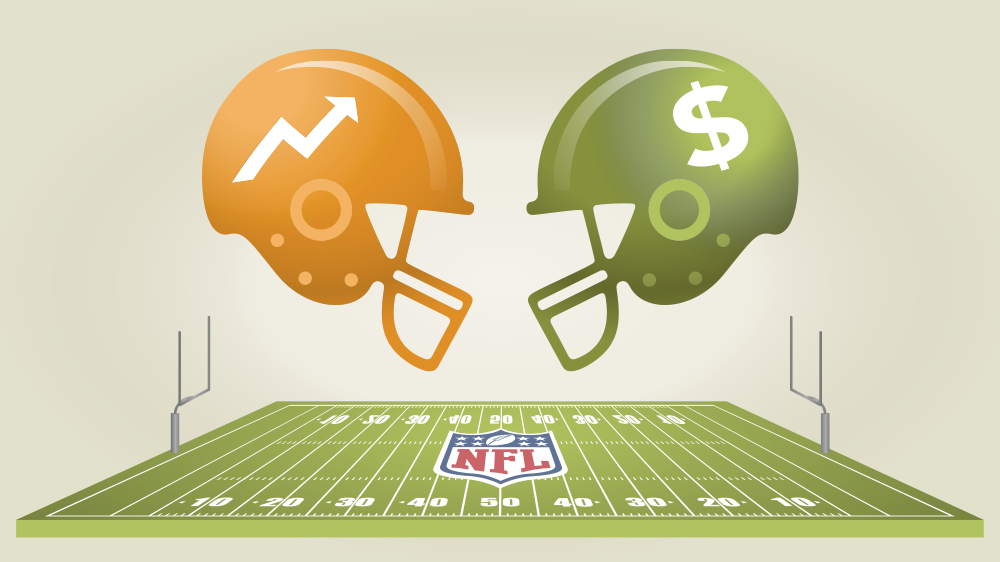
As summer winds down many of us are heartened by the promise of crisp autumn air, pumpkin spice coffee drinks, and the weekly showdowns of NFL football giants.
Amazingly, alongside the absolutely enormous revenue machine that is pro football, a secondary, completely virtual game has grown into a massive industry of its own — fantasy football.
If you’re not familiar, these so-called “rotisserie” leagues are an extremely popular pastime, particularly among male fans once content to simply argue the merits of one quarterback over another or the strategy of a favorite head coach over that of a rival.
A lot of very smart people indulge in fantasy football play, either in office pools or online in big-money tournaments. American Express estimates that nearly 75 million people play each NFL season and spend $4.6 billion on the games.
Yes, there are big prizes — million-dollar purses are common — but the vast majority of participants lose money playing, usually a few hundred bucks they paid out in entry fees.
At first blush, it’s easy to draw comparisons between fantasy football and investing. You have to know the players and their stats to build your virtual team, for instance. If those picks do well week-to-week in the real NFL — completing passes, running yards, sacking and so on — your team wins relative to other fantasy teams in the league.
Likewise, many investors pick stocks to build a portfolio, which then rises or falls on the collective performance of those investments. At any given moment it’s possible to compare a portfolio of handpicked stocks against the whole stock market, say the S&P 500 Index, and determine if your particular mix of shares is “winning” or “losing” at that moment.
In fantasy football, too, you can decide which players to suit up and which to bench during the season. A gut call to start a different quarterback can turn around your fortunes, much the way picking the right one or two technology stocks at the right moment can turn a portfolio of unlucky laggards into a shiny winner.
In both fantasy leagues and short-term investing you have smart people who think hard about their choices, hoping to get an edge and beat all comers. For many, stock investing, like fantasy football, is a form of entertainment and a source of bragging rights.
Here’s where the comparison starts to fall apart. Fantasy football is a classic zero-sum game: A few big winners means there has to be large numbers of small losers. That’s because the fees paid in to play constitute the prize money, minus a percentage for the company running the online league.
Investing can be a zero-sum game, too, if you think like a day trader. Buying a stock on a tip or hearsay can be a thrill — if it suddenly goes up in value. The higher it goes, the more your lucky guess starts to feel like validation, even smarts. You’re good at this!
But, like fantasy football, speculating in frothy, popular stocks is a zero-sum operation. Other short-term traders are getting in and out of the same names, day after day. Nothing substantial changes in terms of the companies behind the widely traded investments. It’s just different hands passing around the same shares.
Some see a dip and panic sell, losing money hand over fist. Like the online leagues running the show, it’s the brokerages that benefit by taking a cut of each trade, no matter the outcome.
Long-term thinking
Actual long-term investing isn’t a zero-sum game at all. Unlike the weekly rush of gridiron gaming or daily ups and down of day trading, prudent investors think in terms of decades.
That’s because long-term investing is “positive sum,” meaning it’s possible for more participants, even all participants, to come out ahead — so long as they are patient.
The fortunes of companies in a thriving economy is based on overall economic growth, which typically is positive for long stretches of time. Accordingly, bull markets last years and years while bear markets often peter out in a few months.
There is very little evidence that picking certain investments over others is worthwhile. Instead, it’s better to diversify and own hundreds or thousands of companies through a low cost, broad-market index fund.
That decision, in turn, keeps money out of the hands of the brokers and other gatekeepers. Keeping more money to invest means more money grows for the investor, rather than an intermediary.
In fact, true investing is less about seeking gains (though gains are welcome!) but about managing risk and achieving a specific return. Fantasy football, and short-term stock trading, is about taking outsize risk for a potentially outsized gain.
That works out for a few some of the time but it fails as a strategy for most, nearly all the time. If you expect to invest and make money at it, better to take the long view.





